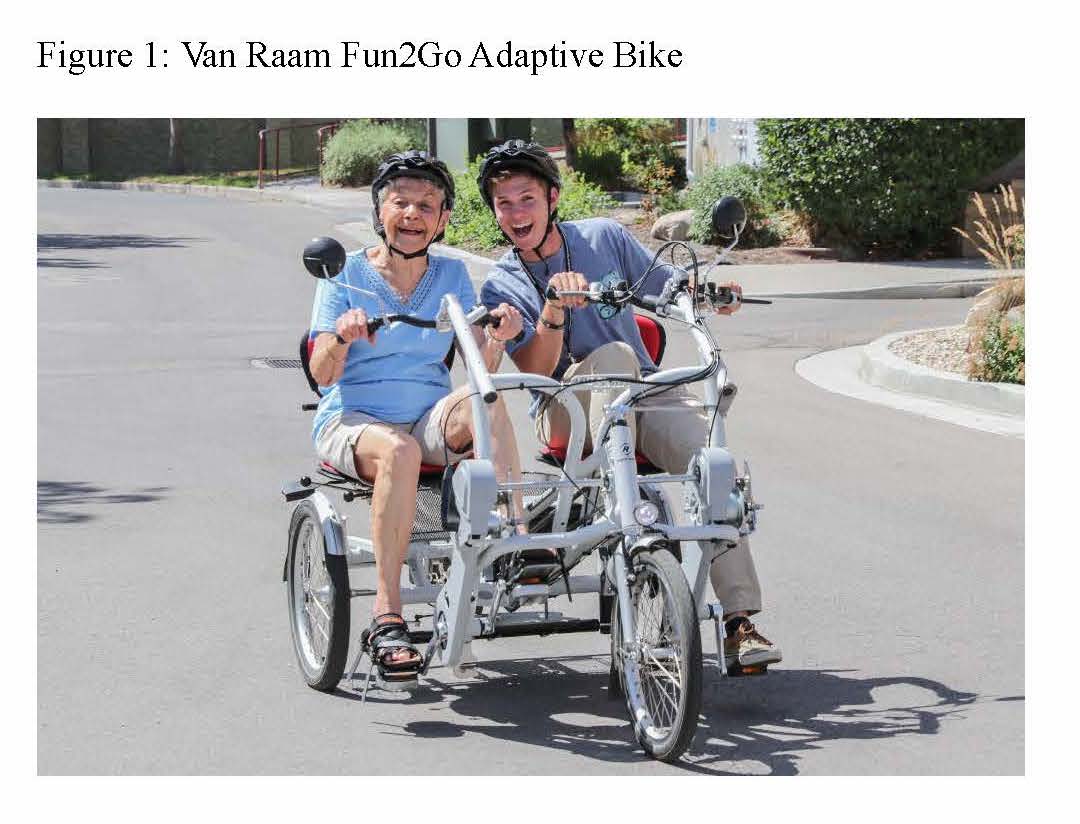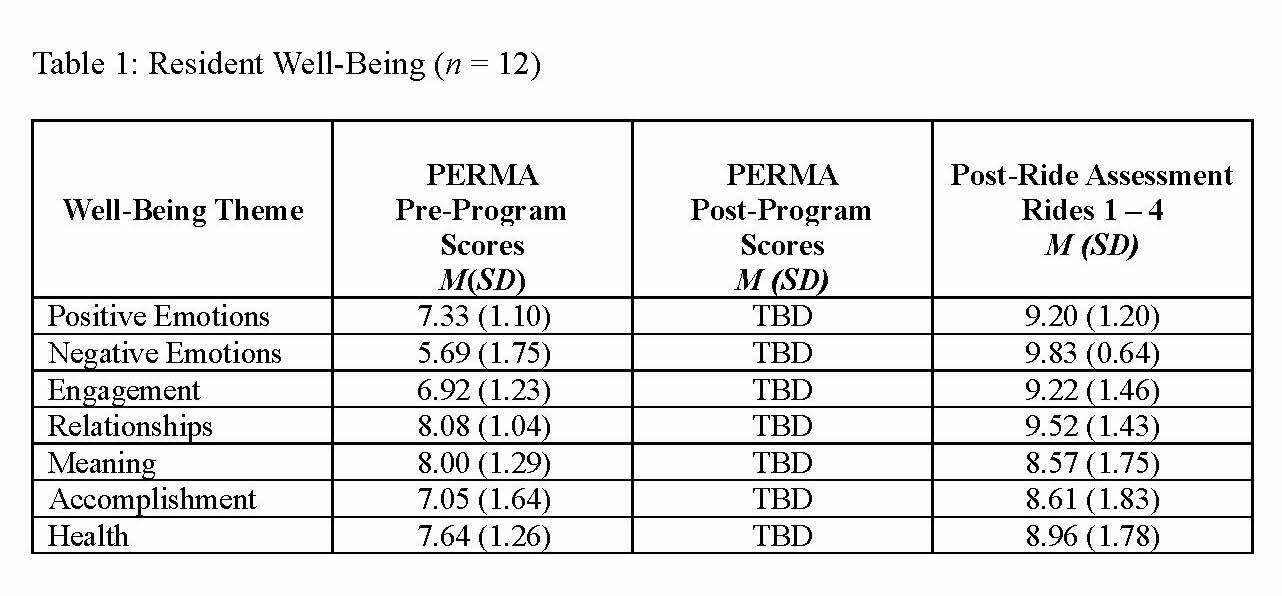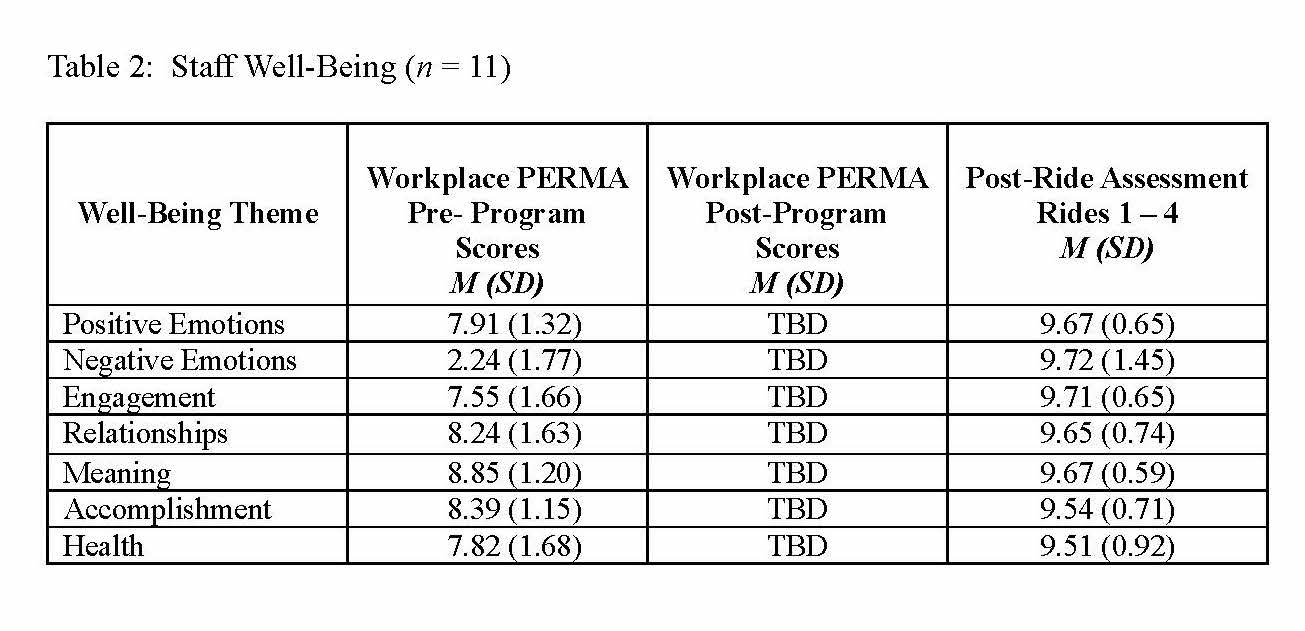College of Health
35 Promoting Well-Being in Assisted Living Residents and Staff Through Adaptive Biking
Riley Page
Faculty Mentor: Rhonda Nelson (Occupational and Recreation Therapies, University of Utah)
Project Overview
Older adults residing in assisted living facilities often face declining health, reduced social interactions, and lack of meaningful activity (Tan et al., 2019). This can negatively impact their wellbeing. Staff are also at risk for decreased wellbeing due to employment issues such as staffing shortages and increased care needs of residents (Woodhead et al., 2016).
One intervention that holds potential to positively impact wellbeing in both residents and staff is adaptive biking. While past research has documented improvements in mood for residents (Buettner & Fitzsimmons, 2002; Buettner et al., 2013; Cotnam, 2020; Fitzsimmons, 2001; Fitzsimmons & Schoenfelder, 2011, McNeil & Westphal) and both physical and psychological functioning for staff (McNeil & Westphal, 2020) following shared bike rides, data are currently lacking on the impact of specific adaptive biking programs on additional aspects of wellbeing. Thus, the purpose of this study was to examine the impact of an adaptive biking program on the wellbeing of residents and staff by using the PERMA model of well-being (Butler & Kern, 2016) as a framework and assessing positive and negative emotions, engagement, relationships, meaning, accomplishment, and health.
Residents (n = 12) and staff (n = 11) were paired into “biking buddies” to complete eight shared bike rides over a six-week period using a side-by-side adaptive bike (Figure 1). Standardized wellbeing assessments including The PERMA Profiler (for residents) and the Workplace PERMA Profiler (for staff) were administered pre- and post-program (Butler & Kern, 2016). Additionally, a study-specific Post-Ride Assessment was used following each of the eight bike rides. Resident and staff perceptions of that ride’s impact on each of the focus areas of wellbeing was evaluated using an 11-point numeric rating scale (0 – 10). Qualitative data were also collected to better understand the subjective experience of participants.
During my time working on this project, we have completed baseline PERMA assessments and documented preliminary findings based on analysis of resident and staff post-ride assessments following the first four rides. Descriptive statistics were used to summarize each ride’s ability to promote wellbeing in terms of positive and negative emotions, engagement, meaning, relationships, accomplishments and health (Tables 1 and 2). Thematic analysis of qualitative comments has provided additional insight on the program’s contribution to resident and staff wellbeing.
Based on results from data that have been collected to date in this ongoing study, we have concluded that residents and staff have a strong interest in an adaptive biking program as an activity to promote their well-being. Pre-intervention PERMA scores indicated good overall well-being at baseline with opportunities for improvement for residents and staff. Based on qualitative data, we have also concluded that participants perceive the bike rides as a positive contributor to all aspects of their well- being. Generally, residents enjoy the socialization, fresh air, and scenery the bike rides provide, and staff enjoy conversation with the resident and the opportunity to learn more about them.
Contribution to my Professional Development
I have learned an astounding amount during the course of this project that has had an extremely positive impact on my professional development. I have gained skills in communication, Recreational Therapy-based facilitation techniques, computer competency, data analysis, organizational skills, and improved response to ambiguity. I have been fortunate enough to observe the positive impact the intervention has had on the individuals I have worked with. I am leaving this program full of immense satisfaction and gratitude knowing I have helped improve the lives and well-being of others. Being a part of this project has also motivated me to further pursue research and other opportunities in the field of Recreational Therapy. Furthermore, I have gained valuable knowledge to better recognize the importance of the roles recreational therapy professionals play in an individual’s overall well-being. In addition, my knowledge of adaptive equipment and the role it plays in Recreational Therapy for older adults has been drastically impacted and improved due to my participation in this project. Throughout the entirety of my time working on this project, I was given the opportunity to showcase my strengths, whilst continuously and persistently improving on a variety of unique skills.
Acknowledgements
This project would not have been possible without the help and support of several individuals and organizations. I would first like to express my gratitude to the Office of Undergraduate Research at the University of Utah, and specifically the Summer Program for Undergraduate Research (SPUR) for granting me such an incredible opportunity. I would also like to thank Crescent Senior Living in Sandy, UT for being incredibly welcoming and dependable throughout the entirety of my time there. Next, I would like to extend my appreciation to all participants of this study who were continuously flexible and dedicated in their participation despite their busy schedules. Finally, I would like to thank my mentor, Rhonda Nelson, Ph.D, MTRS, CTRS, FDRT as well as the Memory Care Director of Crescent Senior Living, Rebecca Westenskow, MS, TRS, CTRS. Dr. Nelson has been a remarkable mentor who has taught me so much and shared her expertise that will truly help prepare me for my future endeavors. Rebecca has worked with me side by side daily every step of the way of this project. This truly would not have been possible without her guidance, and I am immensely grateful for the knowledge she has shared with me. Each of these organizations and individuals have contributed to this incredible experience in profound ways. They have allowed me to make memories that I will always cherish and gain skills that I will always utilize in the pursuit of future opportunities.



Bibliography
Butler, J. & Kern, M. L. (2016). The PERMA-Profiler: International Journal of Welllbeing, 6(3), 1-48 doi:10.5502/ijw.v6i3.1
Buettner, L. L., & Fitzsimmons, S. (2002). AD-venture program: Therapeutic biking for the treatment of depression in long-term care residents with dementia. American Journal of Alzheimer’s Disease and Other Dementias, 17(2), 121–127. https://doi.org/10.1177/153331750201700205
Buettner, L., Fitzsimmons, S., Labban, J. D., & Barba, B. E. (2013). Active lifestyle for older adults with dementia: Wheelchair biking versus other recreational therapy interventions. American Journal of Recreation Therapy, 12(1), 31-40. https://doi.org/10.5055/ajrt.2013.0038
Cotnam, V. (2020). Exploring the effects of the cycling without age program on older adults living in long-term care. Electronic Thesis and Dissertation Repository. 7374. https://ir.lib.uwo.ca/etd/7374
Fitzsimmons, S. (2001). Easy rider wheelchair biking: A nursing-recreation therapy clinical trial for the treatment of depression. Journal of Gerontological Nursing, 27(5), 14-23. https://doi.org/10.3928/0098-9134-20010501-06
Fitzsimmons, S., & Schoenfelder, D.P. (2011). Evidence-based practice guideline: Wheelchair biking for the treatment of depression. Journal of Gerontological Nursing, 37 (7), 8-15. https://doi.org/10.3928/00989134-20110602-03
McNiel, P., & Westphal, J. (2020). Cycling without age program: The impact for residents in long-term care. Western Journal of Nursing Research, 42(9), 728–735. https://doi.org/10.1177/0193945919885130
Tan, J., Abdin, E., Shahwan, S., Zhang, Y., Sambasivam, R., Vaingankar, J., Mahendran, R.,Chua, H., Chong, S., & Subramaniam, M. (2019). Happiness and cognitive impairment among older adults: investigating the mediational roles of disability, depression, social contact frequency, and loneliness. International Journal of Environmental Research and Public Health, 16(24), 4954–. https://doi.org/10.3390/ijerph16244954
Woodhead, E. L., Northrop, L., & Edelstein, B. (2016). Stress, social support, and burnout among long-term care nursing staff. Journal of Applied Gerontology, 35(1), 84–105. https://doi.org/10.1177/0733464814542465

